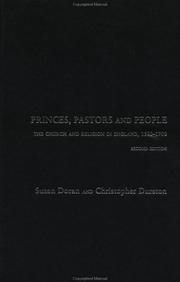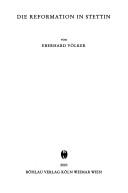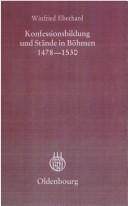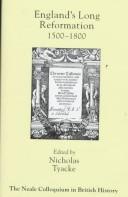
ISBN: 0203255569 9780203255568 0203459237 9780203459232 0415205778 9780415205771 0415205786 9780415205788 9786610057207 6610057206 9781134626403 1134626401 9781134626359 1134626355 9781134626397 1134626398 Year: 2003 Publisher: London New York Routledge
Abstract | Keywords | Export | Availability | Bookmark
 Loading...
Loading...Choose an application
- Reference Manager
- EndNote
- RefWorks (Direct export to RefWorks)
Princes, Pastors and People traces the many changes in religious life that took place in the turbulent years of the Sixteenth and Seventeenth centuries. It is designed to make accessible to readers much of the most recent research, and to guide them through the major historical controversies of the last twenty-five years:* the causes of the English Reformation* the popularity of the Elizabethan Protestant Church* the impact of the Laudian innovations of the 1630s* the Puritan attempt to control popular culture and belief.By adopting a thematic rathe
Book
ISBN: 9783873207271 3873207273 Year: 2011 Volume: 227 Publisher: Baden-Baden: Koerner,
Abstract | Keywords | Export | Availability | Bookmark
 Loading...
Loading...Choose an application
- Reference Manager
- EndNote
- RefWorks (Direct export to RefWorks)
Reformation --- Sources --- Germany --- Church history --- Catalogs, Union --- CHR 2011. --- Pamphlets --- Sources. --- Reformation - Germany - Pamphlets - Bibliography - Union lists --- Reformation - Germany - Sources --- Germany - Church history - 16th century - Bibliography - Union lists
Book
ISBN: 8493044601 9788493044602 Year: 1999 Publisher: Madrid : Falcata ibérica,
Abstract | Keywords | Export | Availability | Bookmark
 Loading...
Loading...Choose an application
- Reference Manager
- EndNote
- RefWorks (Direct export to RefWorks)

ISBN: 3412143022 9783412143022 Year: 2003 Volume: 38. Publisher: Köln : Böhlau,
Abstract | Keywords | Export | Availability | Bookmark
 Loading...
Loading...Choose an application
- Reference Manager
- EndNote
- RefWorks (Direct export to RefWorks)

ISBN: 3486495313 9783486495317 Year: 1981 Volume: 38 Publisher: München Oldenbourg
Abstract | Keywords | Export | Availability | Bookmark
 Loading...
Loading...Choose an application
- Reference Manager
- EndNote
- RefWorks (Direct export to RefWorks)

ISBN: 1280105453 0203214153 9780203214152 9781135360894 9781135360931 9781135360948 9781857287561 9780415516143 0415516145 1135360936 1135360944 Year: 2003 Publisher: London Bristol, Pa. UCL Press
Abstract | Keywords | Export | Availability | Bookmark
 Loading...
Loading...Choose an application
- Reference Manager
- EndNote
- RefWorks (Direct export to RefWorks)
These essays examine the long-term impact of the Protestant reformation in England. This text should be of interest to historians of early modern England and reformation studies.
Reformation --- Christianity --- Religion --- Philosophy & Religion --- English Reformation --- England - Church history - 16th century. --- England - Church history - 17th century. --- England - Church history - 18th century. --- Reformation. --- Reformation - England. --- England --- Church history
Book
ISBN: 9782750904043 2750904048 Year: 2009 Publisher: Paris : Presses de la renaissance,
Abstract | Keywords | Export | Availability | Bookmark
 Loading...
Loading...Choose an application
- Reference Manager
- EndNote
- RefWorks (Direct export to RefWorks)
Reformers --- Church history --- Calvin, Jean, --- Christian History --- Protestantism --- 16th Century --- Biography --- Réformateurs --- Histoire religieuse --- Biography. --- Biographies --- Reformers - Biography --- Church history - 16th century --- Calvin, Jean, - 1509-1564
Book
Year: 2022 Publisher: Heidelberg Heidelberg University Publishing (heiUP)
Abstract | Keywords | Export | Availability | Bookmark
 Loading...
Loading...Choose an application
- Reference Manager
- EndNote
- RefWorks (Direct export to RefWorks)
In search of subsidies for the publishing of his Greek and Latin oeuvre, the Corona Anni, Professor Martin Crusius of Tübingen (1526-1607) pointed out in a letter to Johan Papius, court physician at Ansbach, that it might teach even the Greeks to preach the word of God truly. At this point in time, Crusius could look back on nearly thirty years in which he had exerted himself body and soul for the dissemination of the Lutheran teaching among the Greek-speaking Christians. His 'mission' had begun when his former student Stephan Gerlach had been chosen to travel from the university town in Württemberg to Constantinople as embassy preacher in 1573. Up until his death, Crusius pursued his project of establishing the essentials for a Greek Lutheranism and sending these – at times on adventurous paths – to their recipients. Als der Tübinger Professor Martin Crusius (1526–1607) auf der Suche nach einem Druckkostenzuschuss für sein auf Griechisch und Latein verfasstes Lebenswerk, die Corona Anni, in einem Brief an den Ansbacher Hofarzt Johannes Pappius zu bedenken gab, Daraus kündten auch die Graeci lärnen, rain das Wort Gottes predigen, konnte er auf beinahe dreißig Jahre zurückblicken, in denen er sich mit Leib und Seele dafür eingesetzt hatte, die lutherische Lehre unter den griechischsprachigen Christen zu verbreiten. Seine „Mission“ hatte begonnen, als sein ehemaliger Student Stephan Gerlach ausgewählt wurde, im Jahre 1573 als Botschaftsprediger aus der württembergischen Universitätsstadt nach Konstantinopel, der Hauptstadt des Osmanischen Reiches, zu reisen. Bis zu seinem Tod verfolgte Crusius das Vorhaben, die Grundlagen für ein Luthertum der Griechen zu schaffen und diese – teilweise auf abenteuerlichen Wegen – zu den Adressaten zu schicken.
Book
Year: 2022 Publisher: Heidelberg Heidelberg University Publishing (heiUP)
Abstract | Keywords | Export | Availability | Bookmark
 Loading...
Loading...Choose an application
- Reference Manager
- EndNote
- RefWorks (Direct export to RefWorks)
In search of subsidies for the publishing of his Greek and Latin oeuvre, the Corona Anni, Professor Martin Crusius of Tübingen (1526-1607) pointed out in a letter to Johan Papius, court physician at Ansbach, that it might teach even the Greeks to preach the word of God truly. At this point in time, Crusius could look back on nearly thirty years in which he had exerted himself body and soul for the dissemination of the Lutheran teaching among the Greek-speaking Christians. His 'mission' had begun when his former student Stephan Gerlach had been chosen to travel from the university town in Württemberg to Constantinople as embassy preacher in 1573. Up until his death, Crusius pursued his project of establishing the essentials for a Greek Lutheranism and sending these – at times on adventurous paths – to their recipients. Als der Tübinger Professor Martin Crusius (1526–1607) auf der Suche nach einem Druckkostenzuschuss für sein auf Griechisch und Latein verfasstes Lebenswerk, die Corona Anni, in einem Brief an den Ansbacher Hofarzt Johannes Pappius zu bedenken gab, Daraus kündten auch die Graeci lärnen, rain das Wort Gottes predigen, konnte er auf beinahe dreißig Jahre zurückblicken, in denen er sich mit Leib und Seele dafür eingesetzt hatte, die lutherische Lehre unter den griechischsprachigen Christen zu verbreiten. Seine „Mission“ hatte begonnen, als sein ehemaliger Student Stephan Gerlach ausgewählt wurde, im Jahre 1573 als Botschaftsprediger aus der württembergischen Universitätsstadt nach Konstantinopel, der Hauptstadt des Osmanischen Reiches, zu reisen. Bis zu seinem Tod verfolgte Crusius das Vorhaben, die Grundlagen für ein Luthertum der Griechen zu schaffen und diese – teilweise auf abenteuerlichen Wegen – zu den Adressaten zu schicken.
Digital
Year: 1721 Publisher: London Printed for D. Browne ... and G. Strahan ...
Abstract | Keywords | Export | Availability | Bookmark
 Loading...
Loading...Choose an application
- Reference Manager
- EndNote
- RefWorks (Direct export to RefWorks)

 Search
Search Feedback
Feedback About UniCat
About UniCat  Help
Help News
News